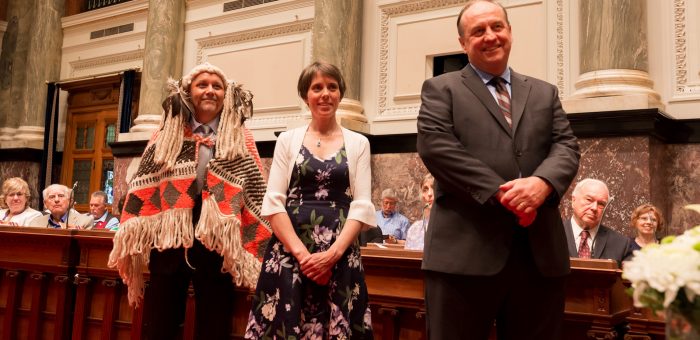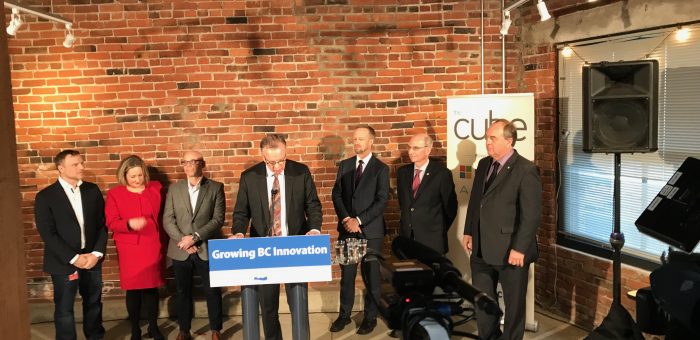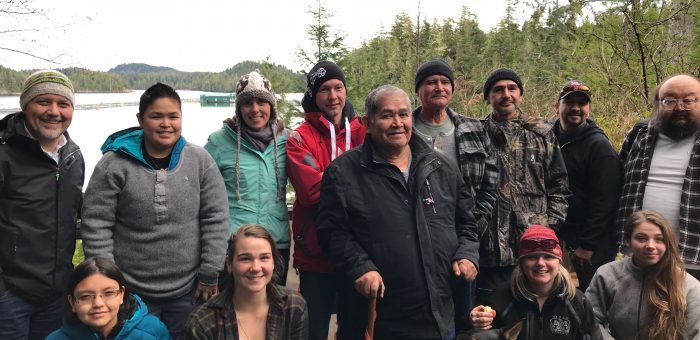Uncategorized
Wildfire and flood report demonstrates need to prioritize adaptation and greenhouse gas reduction strategies
A new report was published today which examines and assesses the government’s response to the 2017 flood and wildfire events. The report, entitled: Addressing the New Normal: 21st Century Disaster Management in British Columbia was written by former MLA George Abbott and Hereditary Chief of the Sq’ewá:lxw First Nation, Maureen Chapman. It provided government with 108 recommendations that will assist it to improve existing systems, processes and procedures.
Below I reproduce the media release we issued in response to the release of the report.
Media Release
Weaver: Wildfire and flood report demonstrates need to prioritize adaptation and greenhouse gas reduction strategies
For immediate release
May 10, 2018
VICTORIA, B.C. – Andrew Weaver, leader of the B.C. Green Party caucus, says that the new report on the 2017 flood and wildfire response underscores the need for B.C. to meet our climate targets.
“Chief Chapman and Mr. Abbott have provided excellent recommendations for how the government can better support communities that are affected by wildfires and floods,” said Weaver.
“The effects of climate change are having nuanced impacts on every corner of the province. We must do everything we can to ensure British Columbians have the resources they need to respond to the ‘new normal’ of extreme weather events. In particular, the province should adopt the report’s recommendations to work more closely in partnership with First Nations and to develop better preventative measures to support communities that are vulnerable to floods and wildfires.
“These rising costs also demonstrate the urgent need to keep our commitment to the next generation to meet our climate targets. Under the Paris Agreement, countries around the world is coming together to do their part to prevent an increase in global temperatures above 2 degrees Celsius. We are seeing historic investments in cleantech and renewable energy from countries diverse as China, Germany and Saudi Arabia as the world transitions to the low-carbon economy.
“B.C. was once a leader in climate action. After enacting the carbon tax in 2008, British Columbia showed the world that a strong economy and bold climate action are perfectly compatible. By seizing the opportunity to reclaim this leadership, we can position our province to develop a thriving 21st century economy centred around innovation, sustainable value-added resource development and entrepreneurship.”
-30-
Media contact
Jillian Oliver, Press Secretary
+1 778-650-0597 | jillian.oliver@leg.bc.ca
Where’s the legislative agenda? Another miscellaneous statutes amendment act!
Today in the BC Legislature we debated at second reading Bill 7: Miscellaneous Statues Amendment Act, 2018. Such miscellaneous statute amendment bills are considered house keeping bills that contain numerous minor changes to several existing pieces of legislation. Typically these changes emerge as clarifications prompted from questions that have arisen in interpreting existing legislation.
Such bills are common. But what concerns me is that we are now half way through this legislative session and the government has yet to introduce any substantive new legislation. I was hoping for much more. The BC Greens would be thrilled to implement our ideas if the government is at a loss as to what should be done.
Below I reproduce the video and text of my brief speech.
Video of Speech
Text of Speech
A. Weaver: I rise with great pleasure to speak to Bill 7, the Miscellaneous Statutes Amendment Act. These are typically acts that we don’t debate very often, hon. Speaker, as you will know, as they’re housekeeping acts — acts that typically have highlighted a number of problems that have arisen, and legal challenges, etc., through the years.
In this particular case, we’re fixing a few things in the Interpretation Act — important things, defining where a time starts and ends for various measures — and little additions to the Crown Proceeding Act, as well as the Cooperative Association Act, the Building Act, the Fire Services Act and, of course, the Ministry of Provincial Secretary and Government Services Act.
Now, obviously, I speak in support of these changes. These changes are the culmination of a lot of hard work done by civil service legislative drafters, trying to ensure that our bills and laws are as up to date, as succinct and clear and easy to interpret as possible.
But on the broader question…. The broader question is really this. We are now halfway through this session. We are going to end at the end of this week. As it stands, the members of the opposition have brought in more bills to debate than has government.
In fact, the government has only brought in four bills. What is government doing?
We’re here to debate the Miscellaneous Statutes Amendment Act. When I sat on the other side, I used to listen to member after member in the opposition then and now government hurl abuse at the B.C. Liberals — abuse about the fact that all we were debating was miscellaneous statutes amendments acts. Sometimes, there were three such acts. Here we now have a government that’s been in power for nearly eight months, and what are we debating? We’re debating Bill 7, Miscellaneous Statutes Amendment Act.
Where’s the Family Day amendment act? We know that the Premier has stood up and said that Family Day is going to change. It’s one line that needs to change in that act. Why aren’t we debating that? We had the members opposite, when they were in opposition, bringing in bill after bill after bill for years. Where are all of those bills?
Obviously, I stand in support of this, as both sides stood in support of the Supply Act to ensure that the government was paid, but really, this is not good enough. Government has been in power for eight months, and this is the level of our debate here. Frankly, I’m tired of it, and British Columbians are tired of it. I think that we need to shape up here in British Columbia and ensure that we’re actually debating legislation about the issues that British Columbians care about.
With that, hon. Speaker, I thank you for your time, and I look forward to finally debating some other bills that we hope, at some point, will actually be brought forward to this Legislature.
Exploring the mandate and expanded scope of Innovate BC
Today in the BC Legislature we debated Bill 4: British Columbia Innovation Council Amendment Act at the committee stage. As I discussed earlier, this bill renames the BC Innovation Council as Innovate BC and expands its mandate.
This bill represents further developments towards implementing an important initiative that formed a component of the BC Green economic plan in the last campaign.
In my exchange with the Minister of Jobs, Trade and Technology, I sought to explore his vision of Innovate BC. I was delighted with his thoughtful responses.
Below I reproduce the text and video of our exchange.
Text of Exchange
A. Weaver: Continuing with section 3, I have one somewhat technical question and a number of broader questions.
The Chair: Members, we are on section 5.
A. Weaver: Sorry, section 5 of Bill 4, section 3 that is being amended in the BCIC Amendment Act. Thank you for that clarification, hon. Chair.
The first question is with respect to section 3(e) of the act that is to be amended, not section 5 of the bill that’s the amendment act. It says specifically there that one of the purposes is to “gather and organize information on scientific research.” I’m questioning why the word “technological” was not added as well as “scientific research.” The question is: is this being left out explicitly, or is science to include technology here?
The reason why I do that is that a number of times in this section — that is, section 3 of the act that’s amended, section 5 of the act that’s doing the amending — “science” has been replaced by “science and technology.” And it’s really this one place where it hasn’t. So my question to the minister is: does this mean to include scientific and technological research, as it says, actually, earlier in the same section?
Hon. B. Ralston: I just wanted to clarify the member’s question. In the previous act, he seems to be referring to section 3(e), which reads: “…gather and organize information on scientific research.” Is that correct?
A. Weaver: That is correct. I’m wondering whether it should be “scientific and technological research,” because we’re changing it in (d) and (f) there. Also, earlier in that actual section 3 there, it talks about the importance of the “development and dissemination of scientific, technological and scholarly knowledge.”
I’m wondering whether the research is actually also technological here. It may sound like semantics, but I don’t know whether it’s just inadvertent or whether it’s deliberate.
Hon. B. Ralston: I better understand the member’s question now.
Section (e) focuses, in the previous act, on scientific research. The amendments are to (d) and (f), substituting for “science policy”, “science, technology and innovation policy.” The focus there is not on research but on policy.
I don’t think there was an intention to change (e). It was rather to expand the scope of the policy that would flow from, whether it’s, scientific research or technology in general. I think that’s the reason for the distinction.
A. Weaver: I appreciate the clarification. To further that, though, if the minister is able to look at section (c), it actually talks about the “development and dissemination of scientific, technological and scholarly information.”
I’m wondering whether there’s an inconsistency there. On the one hand, you’re disseminating and developing scientific, technological and scholarly research, but on the other, you’re just looking at the science aspect.
Hon. B. Ralston: I don’t think there’s an intention to emphasize or create a difficulty there. The focus is on the development of a broader policy beyond science policy, technological policy and innovation policy.
That’s clearly not the intention to…. I think the member has made a perceptive point, but I don’t think it really detracts from the purposes of the amendment.
A. Weaver: Thank you for the clarification.
I have a number of general questions about the role of Innovate B.C. In particular, I’m wondering if the minister could identify the relationship between the innovation commissioner and Innovate B.C., as reconstituted in this amended act here.
Hon. B. Ralston: Innovate B.C. and the innovation commissioner will be separate entities, but they will work closely together, obviously.
The commissioner is mandated to be an advocate for the tech industry, both here in British Columbia — to our federal counterparts — and, indeed, abroad. The commissioner will interact with board members and will be an ex officio member — will be invited to participate in Innovate B.C.’s board members as an ex officio member. There will be a close relationship, but the office of the innovation commissioner will be independent of the agency.
A. Weaver: Thank you for the answer. It actually answered my next question. Would the innovation commissioner be a member of the board or an ex officio member? That has been clarified as well.
My next question is with respect to…. With this new vision, as outlined in section 5 of the amendment act, pertaining to an amendment in section 3 of the original act, what is the…? If the minister could articulate in a few words what he would define as the new mission statement for Innovate B.C…. Has the minister got an idea in mind? If he were to succinctly express, in two sentences…. What is the mission statement of Innovate B.C., as reconstituted here?
Hon. B. Ralston: I’ve attended — and I’m sure, probably, the member has — board meetings or retreats of organizations where a mission statement will sometimes be worked on for days, if not weeks, and a lot of internal debate will take place about the exact wording of a mission statement. So to ask me to give a precise mission statement here is something that I approach with some caution.
The goal of the organization is to focus on and use innovation and support for innovation to catalyze companies to be more successful in what they do, or even research institutions to be more successful. It’s a broad look at the power and transformational force of innovation as applied to a wide range of human and societal problems.
A. Weaver: That’s very helpful, and I would never ask the minister to develop a mission statement in committee stage. It would simply be something that he could not be held accountable to — understandably so. I have, too, been in those board meetings that have taken days to decide whether it should be a “that’ or an “an” or “they.”
My next question that is following on that previous question…. Actually, as articulated here in section 5(b), where it uses the words “innovation policy,” I’m wondering if the minister would be able to define specifically what he means by innovation.
Hon. B. Ralston: I did have a discussion with the member before lunch, and I got an opportunity to think about the question, which he very kindly told me he was going to ask me in advance.
I don’t think I’d want to be confined to a single definition of innovation. One looks at different institutions, and innovation has different effects and consequences. For example, research institutions, whether it’s catalyzing or driving the creative and intellectual abilities of researchers and students or whether it’s the kind of innovation that drives companies of all sizes to develop either new products or new services that allow them to grow and fuel the economy.
Clearly, innovations can be big, can be huge, whether we’re thinking of a company like General Fusion, which I’ve met with and I’m sure the member is familiar with, where the innovation that they’re recommending would literally transform the world — I don’t think that’s an understatement — or whether there are small process innovations in the way in which a manufacturing process goes forward. Sometimes practitioners on the shop floor will think of a way that things might be improved. That, too, would be an innovation.
I think what we’re hoping to do is to take a wide view of innovation in all its aspects and look to it, in a competitive and rapidly changing world, to draw on the creativity and talent of the people of British Columbia and use innovation and creative change to solve human problems, make things better, make companies grow and prosper and generally enhance the quality of life of everyone in the province.
A. Weaver: Thank you for the very helpful response.
My last question is on the issue of technology. We’ve heard a lot of discourse. I thank the member for Shuswap, who asked a number of probing questions, and the minister for his responses.
We’ve heard a lot about innovation in technology. I’m wondering if the minister could expand upon what he means by technology, more for clarifying the public record. Many people often think that technology means apps and stuff that has chips on it. Here, the minister has a broader definition of what technology is — innovation in technology and innovation in general. In what areas other than just chips, computers or apps is he thinking when he’s talking about innovation, perhaps, in technology and elsewhere?
Hon. B. Ralston: I would adopt the answer that the member suggested, which is a broad scope of innovation. I agree with him that sometimes there’s a view that innovation is confined to software developers in downtown Vancouver. That is most assuredly not the case. Whether it’s in Kamloops at the Kamloops Innovation Centre, in Prince George at the clean-tech innovation hub that’s being developed by the economic director there at the city hall, or in Victoria here with Tectoria, it’s certainly geographically broad. The scope of the problems that are tackled — and what is meant by technology — is very broad indeed.
Technology is capable of revolutionizing and changing very traditional industries, such as the mining industry. I think I’ve repeatedly given a couple of examples. MineSense, which is a company using the Internet of things and sensors, devised a process to examine ore that’s been extracted and sort it more quickly, more thoroughly and more efficiently, thereby increasing the efficiency and, ultimately, the profit of the company. LlamaZOO, which has a visualization technology that looks at a mine before it’s developed, inputs all the data and then represents that in a visual display of the minesite itself, in a way that helps people to understand what the mine might look like, what the ore body might look like it or how it may be extracted more efficiently.
I don’t think I would want to be confined by that narrow definition of technology, certainly, whether it’s technology or it’s innovation solutions applied to climate change, or life sciences or ICT, across the board. Some people speak…. There’s an institution at Simon Fraser University that speaks of social innovation — in other words, applying some of the same techniques, some of the same inspiration and some of the same talent to major social problems, whether that might be addiction or the problems of aging.
I think there’s always room, and the hope is that there are lots of solutions coming that can be implemented to solve problems and make life better for everyone.
Video of Exchange
Calling on the province to establish secretariat responsible for wild salmon
This week we rose each day during Question Period to ask the government about what, if anything, it was doing to protect wild salmon along the coast of British Columbia. Midweek I provided an update following the question I asked.
Today we concluded our line of questioning by calling on the government to establish a secretariat responsible for wild salmon.
Below I reproduce our accompanying news release.
Media Release
B.C. Green caucus calls on province to establish secretariat responsible for wild salmon
For immediate release
March 1, 2018
VICTORIA, B.C. – The B.C. Green caucus is calling on the government to immediately establish a secretariat responsible for wild salmon. The caucus’ call comes after a week of questioning the government over its plans to protect wild salmon.
“Wild salmon are a foundational B.C. species of vital importance to our economy and to our communities,” said Adam Olsen, spokesperson for natural resources and agriculture. “The MLAs that now sit on the government side of the house are well aware of the risks facing this species, having often drawn attention to this issue when in opposition. It is time to move beyond words and take action. There is absolutely no reason to delay taking action to help restore B.C.’s wild salmon stocks to levels that support a healthy environment and a thriving wild salmon fishery.”
Andrew Weaver, leader of the B.C. Green Party, added that the Premier’s response today strengthens the case for a secretariat: “Even the Premier acknowledges that the questions posed to his government this week demonstrate serious inter-jurisdictional and cross-ministerial challenges. As Adam argued today, secretariats have been created to respond to issues like climate change and conflict of interest. A dedicated, empowered secretariat would ensure this issue of importance to so many British Columbians, and especially coastal First Nations, is given the prioritization it deserves.”
To be effective, the secretariat responsible for wild salmon would need to granted adequate funding and authority. A wild salmon secretariat could streamline and coordinate all the work being done and stand as a united representative in negotiations with DFO.
“At present, responsibility for steelhead and wild salmon is split among six government ministries in addition to the federal Department of Fisheries,” added Sonia Furstenau, spokesperson for environment. “It has become clear that this confusing, inefficient system is not making headway on the policy changes that are needed to promote healthy levels of wild salmon stocks. I am proud to stand with my colleagues in calling for this much-needed office.”
-30-
Media contact
Jillian Oliver, Press Secretary
+1 778-650-0597 | jillian.oliver@leg.bc.ca
Paying tribute to Dave Barrett in the BC Legislature
Today in the BC Legislature the Premier, Leader of the Official Opposition and I paid tribute to former NDP Premier Dave Barrett who passed away on February 2, 2018.
Below I attach the video and text of my tribute.
Video of Tribute
Text of Tribute
A. Weaver: I rise to pay tribute on behalf of the B.C. Green caucus to a great British Columbian, Dave Barrett, who passed away on February 2 of this year. I also wish to extend my sincere condolences to his family gathered in the gallery today.
Dave Barrett dedicated much of his life to the service of British Columbians. He did so with passion. He did so with commitment. He did so with integrity, and he did so both here in the B.C. Legislature as well as in the Houses of Parliament in Ottawa.
Dave Barrett, without a doubt, was one of Canada’s great Premiers. During his time as Premier from 1972 to 1975, his government passed a remarkable 367 bills, averaging one every three days. Much of his legacy has stood the test of time. His government created ICBC, launched PharmaCare and passed the human rights code, to name but a few of his impressive and lasting achievements.
In 1973, British Columbia was faced with sprawling urban development that threatened to swallow up precious agricultural land, including some of the best farmland in Canada. It was a challenge with opponents down every avenue, and one that a timid political leader would likely have avoided. Premier Dave Barrett and his government rose to the challenge through principled and focused leadership.
They preserved Cypress Bowl — what he described as his greatest legacy — and they protected vast swaths of land from developing by creating the agricultural land reserve, ensuring that future generations would have access to quality farmland and locally grown food. It was an act that angered many in the development community, but it was a bold and important act that was grounded in the principle of intergenerational equity.
A great orator. A gregarious individual with a wicked sense of humour. A man of integrity and principles, and a man of the people. These are but a few of the traits for which he will be remembered.
As a junior high school student in the mid-1970s, Dave Barrett’s political leadership inspired me. His lasting legacy continues to do just that each and every day in the Legislature.
As we say goodbye to Premier Barrett, we should collectively reflect upon his great accomplishments, for it is with leadership like his that we can continue a build a province that is forward-looking, innovative and compassionate.
Thank you, Dave Barrett, for all that you did. You will be missed but never forgotten.








